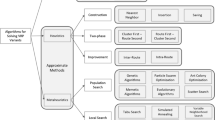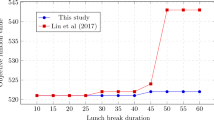Abstract
In recent years, rapid rail transit systems have played a unique role in transportation systems due to the demand increase in accommodating passengers. This study proposes a simulation–optimization method to improve the resiliency of the train timetable in rapid transit rail lines under uncertainty associated with the passenger flow and train running times. The aim is to evaluate the resiliency of the train timetable through a discrete-event simulation (DES) model and to provide an optimized schedule with the maximum degree of resiliency against random disruptions caused by passenger flow fluctuations. The problem is first formulated as a mixed-integer nonlinear programming model. The validity of the DES model is justified using convergence test analysis of the response variable, i.e., average passenger wait time, during the simulation run. Due to the complexity of the problem, a variable neighborhood search (VNS) and a genetic algorithm (GA) are proposed to solve large instances of the problem. A self-adaptive tuning approach is proposed to adjust the GA parameters. The benefit of the simulation–optimization approach is verified through numerical experiments based on real cases adopted from Line No. 1 of the Tehran underground metro system. The results indicate that the simulation-based optimization method could improve the resiliency of train services by almost 16.7%, on average, as against the all-stop service operation. The average improvement of using VNS as against the GA is about 47%. Also, VNS method provides better-quality solutions by average optimality gap of about 14% in all test instances when compared to an exact solution method, i.e., branch-and-reduce algorithm.














Similar content being viewed by others
References
Abdelhafiez EA, Salama MR, Shalaby MA (2017) Minimizing passenger travel time in URT system adopting skip-stop strategy. J Rail Transp Plan Manag 7:277–290
Adjetey-Bahun K, Birregah B, Châtelet E, Planchet J-L (2016) A model to quantify the resilience of mass railway transportation systems. Reliab Eng Syst Saf 153:1–14
Altazin E, Dauzère-Pérès S, Ramond F, Tréfond S (2017) Rescheduling through stop-skipping in dense railway systems. Transp Res Part C Emerg Technol 79:73–84
Bruyelle J-L, O’neill C, El-Koursi E-M, Hamelin F, Sartori N, Khoudour L (2014) Improving the resilience of metro vehicle and passengers for an effective emergency response to terrorist attacks. Saf Sci 62:37–45
Cao Z, Yuan Z, Li D (2014) Estimation method for a skip-stop operation strategy for urban rail transit in China. J Mod Transp 22:174–182
Cao Z, Yuan Z, Zhang S (2016) Performance analysis of stop-skipping scheduling plans in rail transit under time-dependent demand. Int J Environ Res Public Health 13:707
Chen X, Hellinga B, Chang C, Fu L (2015) Optimization of headways with stop-skipping control: a case study of bus rapid transit system. J Adv Transp 49:385–401
Cox A, Prager F, Rose A (2011) Transportation security and the role of resilience: a foundation for operational metrics. Transp Policy 18:307–317
Ding Y, Chien S (2001) Improving transit service quality and headway regularity with real-time control. Transp Res Rec J Transp Res Board 1760:161–170
D’lima M, Medda F (2015) A new measure of resilience: an application to the London underground. Transp Res Part A Policy Pract 81:35–46
Eberlein XJ, Wilson NH, Barnhart C, Bernstein D (1998) The real-time deadheading problem in transit operations control. Transp Res Part B Methodol 32:77–100
Eberlein XJ, Wilson NHM, Bernstein D (1999) Modeling real-time control strategies in public transit operations. In: Wilson NHM (ed) Computer-aided transit scheduling. Lecture Notes in Economics and Mathematical Systems, vol 471. Springer, Berlin, Heidelberg
Eskandari H, Rahaee MA, Memarpour M, Nayebi EH, Malek SA (2013) Evaluation of different berthing scenarios in shahid rajaee container terminal using discrete-event simulation. In: Proceedings of the 2013 winter simulation conference: simulation: making decisions in a complex world. IEEE Press, pp 3462–3474
Gholizad A, Ahmadi L, Hassannayebi E, Memarpour M, Shakibayifar M (2017) A system dynamics model for the analysis of the deregulation in electricity market. Int J Syst Dyn Appl (IJSDA) 6:1–30
Hansen P, Mladenović N (2001) Variable neighborhood search: principles and applications. Eur J Oper Res 130:449–467
Hassannayebi E, Zegordi SH (2017) Variable and adaptive neighbourhood search algorithms for rail rapid transit timetabling problem. Comput Oper Res 78:439–453
Hasannayebi E, Sajedinejad A, Mardani S, Mohammadi KS (2012) An integrated simulation model and evolutionary algorithm for train timetabling problem with considering train stops for praying. In: Proceedings of the winter simulation conference, p 421
Hassannayebi E, Sajedinejad A, Mardani S (2014) Urban rail transit planning using a two-stage simulation-based optimization approach. Simul Model Pract Theory 49:151–166
Hassannayebi E, Sajedinejad A, Mardani S (2016a) Disruption management in urban rail transit system: a simulation based optimization approach. In: Handbook of research on emerging innovations in rail transportation engineering. Igi-Global
Hassannayebi E, Zegordi SH, Amin-Naseri MR, Yaghini M (2016b) Demand-oriented timetable design for urban rail transit under stochastic demand. J Ind Syst Eng 9:28–56
Hassannayebi E, Zegordi SH, Yaghini M (2016c) Train timetabling for an urban rail transit line using a Lagrangian relaxation approach. Appl Math Model 40:9892–9913
Hassannayebi E, Zegordi SH, Amin-Naseri MR, Yaghini M (2017a) Train timetabling at rapid rail transit lines: a robust multi-objective stochastic programming approach. Oper Res Int J 17:435–477
Hassannayebi E, Zegordi SH, Yaghini M, Amin-Naseri MR (2017b) Timetable optimization models and methods for minimizing passenger waiting time at public transit terminals. Transp Plan Technol 40:278–304
Hassannayebi E, Zegordi SH, Amin-Naseri MR, Yaghini MJPT (2018) Optimizing headways for urban rail transit services using adaptive particle swarm algorithms. Public Transp 10:23–62
Huang Y, Yang L, Tang T, Cao F, Gao Z (2016) Saving energy and improving service quality: bicriteria train scheduling in urban rail transit systems. IEEE Trans Intell Transp Syst 17:3364–3379
Ilati G, Sheikholeslami A, Hassannayebi E (2014) A simulation-based optimization approach for integrated port resource allocation problem. Promet-Traffic Transp 26:243–255
Jamili A, Aghaee MP (2015) Robust stop-skipping patterns in urban railway operations under traffic alteration situation. Transp Res Part C Emerg Technol 61:63–74
Jiang F, Cacchiani V, Toth P (2017) Train timetabling by skip-stop planning in highly congested lines. Transp Res Part B Methodol 104:149–174
Jin JG, Tang LC, Sun L, Lee D-H (2014) Enhancing metro network resilience via localized integration with bus services. Transp Res Part E Logist Transp Rev 63:17–30
Jong J-C, Suen C-S, Chang S (2012) Decision support system to optimize railway stopping patterns: application to Taiwan high-speed rail. Transp Res Rec J Transp Res Board 2289:24–33
Khan MB, Zhou X (2010) Stochastic optimization model and solution algorithm for robust double-track train-timetabling problem. IEEE Trans Intell Transp Syst 11:81–89
Koutsopoulos HN, Wang Z (2007) Simulation of urban rail operations: application framework. Transp Res Rec J Transp Res Board 2006:84–91
Lee Y-J, Shariat S, Choi K (2014) Optimizing skip-stop rail transit stopping strategy using a genetic algorithm. J Public Transp 17:7
Li Y, Rousseau JM, Gendreau M (1991) Real time scheduling on a transit bus route: a 0-1 stochastic programming model. The Transportation Research Board (TRB) annual meeting
Middelkoop D, Bouwman M (2000) Train network simulator for support of network wide planning of infrastructure and timetables. In: International conference on computers in railways, pp 267–276
Miller-Hooks E, Zhang X, Faturechi R (2012) Measuring and maximizing resilience of freight transportation networks. Comput Oper Res 39:1633–1643
Morlok EK, Vandersypen HL (1973) Schedule planning and timetable construction for commuter railroad operations. Transp Eng J ASCE 99:627–636
Niu H (2011) Determination of the skip-stop scheduling for a congested transit line by bilevel genetic algorithm. Int J Comput Intell Syst 4:1158–1167
Niu H, Zhou X, Gao R (2015) Train scheduling for minimizing passenger waiting time with time-dependent demand and skip-stop patterns: nonlinear integer programming models with linear constraints. Transp Res Part B Method 76:117–135
O’dell SW, Wilson NHM (1999) Optimal real-time control strategies for rail transit operations during disruptions. In: Wilson NHM (ed) Computer-aided transit scheduling. Lecture Notes in Economics and Mathematical Systems, vol 471. Springer, Berlin, Heidelberg
Paolucci M, Pesenti R (1999) An object-oriented approach to discrete-event simulation applied to underground railway systems. Simulation 72:372–383
Qi J, Li S, Gao Y, Yang K, Liu P (2018) Joint optimization model for train scheduling and train stop planning with passengers distribution on railway corridors. J Oper Res Soc 69(4):556–570. https://doi.org/10.1057/s41274-017-0248-x
Rahimi Mazrae Shahi M, Fallah Mehdipour E, Amiri M (2016) Optimization using simulation and response surface methodology with an application on subway train scheduling. Int Trans Oper Res 23:797–811
Sahinidis NV (1996) Baron: a general purpose global optimization software package. J Glob Optim 8:201–205
Sajedinejad A, Mardani S, Hasannayebi E, Mir Mohammadi KS, Kabirian A (2011) Simarail: simulation based optimization software for scheduling railway network. In: Proceedings of the 2011 winter simulation conference (WSC). IEEE, pp 3730–3741
Shafieezadeh M, Kalantar Hormozi M, Hassannayebi E, Ahmadi L, Soleymani M, Gholizad A (2019) A system dynamics simulation model to evaluate project planning policies. Int J Model Simul. https://doi.org/10.1080/02286203.2019.1596779
Shakibayifar M, Hassannayebi E, Mirzahossein H, Zohrabnia S, Shahabi A (2017a) An integrated train scheduling and infrastructure development model in railway networks. Sci Iran 24:3409–3422
Shakibayifar M, Sheikholeslami A, Corman F, Hassannayebi E (2017b) An integrated rescheduling model for minimizing train delays in the case of line blockage. Oper Res Int J. https://doi.org/10.1007/s12351-017-0316-7
Shakibayifar M, Hassannayebi E, Mirzahossein H, Taghikhah F, Jafarpur A (2019) An intelligent simulation platform for train traffic control under disturbance. Int J Model Simul 39(3):135–156. https://doi.org/10.1080/02286203.2018.1488110
Shang P, Li R, Liu Z, Yang L, Wang Y (2018) Equity-oriented skip-stopping schedule optimization in an oversaturated urban rail transit network. Transp Res Part C Emerg Technol 89:321–343
Shen S, Wilson NHM (2001) An optimal integrated real-time disruption control model for rail transit systems. In: Voß S, Daduna JR (eds) Computer-aided scheduling of public transport. Lecture Notes in Economics and Mathematical Systems, vol 505. Springer, Berlin, Heidelberg
Shi J, Yang L, Yang J, Gao Z (2018) Service-oriented train timetabling with collaborative passenger flow control on an oversaturated metro line: an integer linear optimization approach. Transp Res Part B Methodol 110:26–59
Sun A, Hickman M (2005) The real-time stop-skipping problem. J Intell Transp Syst 9:91–109
Vuchic RJHW (2005) Urban transit: operations, planning, and economics. Wiley, Hoboken
Wang Y, De Schutter B, Van Den Boom T, Ning B, Tang T (2013) Real-time scheduling for single lines in urban rail transit systems. In: IEEE international conference on intelligent rail transportation (ICIRT). IEEE, pp 1–6
Wang Y, De Schutter B, Van Den Boom TJ, Ning B, Tang T (2014) Efficient bilevel approach for urban rail transit operation with stop-skipping. IEEE Trans Intell Transp Syst 15:2658–2670
Yalcınkaya Ö, Bayhan GM (2009) modelling and optimization of average travel time for a metro line by simulation and response surface methodology. Eur J Oper Res 196:225–233
Yang L, Qi J, Li S, Gao Y (2016) Collaborative optimization for train scheduling and train stop planning on high-speed railways. Omega 64:57–76
Yang X, Dong H, Yao X (2017) Passenger distribution modelling at the subway platform based on ant colony optimization algorithm. Simul Model Pract Theory 77:228–244
Yang S, Wu J, Yang X, Liao F, Li D, Wei Y (2019) Analysis of energy consumption reduction in metro systems using rolling stop-skipping patterns. Comput Ind Eng 127:129–142
Yu G, Qi X (2004) Disruption management. World Scientific, Singapore
Funding
This research received no specific grant from any funding agency in the public, commercial, or not-for-profit sectors.
Author information
Authors and Affiliations
Corresponding author
Ethics declarations
Conflict of interest
The authors declare that there is no conflict of interests regarding the publication of this paper.
Additional information
Publisher's Note
Springer Nature remains neutral with regard to jurisdictional claims in published maps and institutional affiliations.
Rights and permissions
About this article
Cite this article
Shahabi, A., Raissi, S., Khalili-Damghani, K. et al. Designing a resilient skip-stop schedule in rapid rail transit using a simulation-based optimization methodology. Oper Res Int J 21, 1691–1721 (2021). https://doi.org/10.1007/s12351-019-00523-y
Received:
Revised:
Accepted:
Published:
Issue Date:
DOI: https://doi.org/10.1007/s12351-019-00523-y




